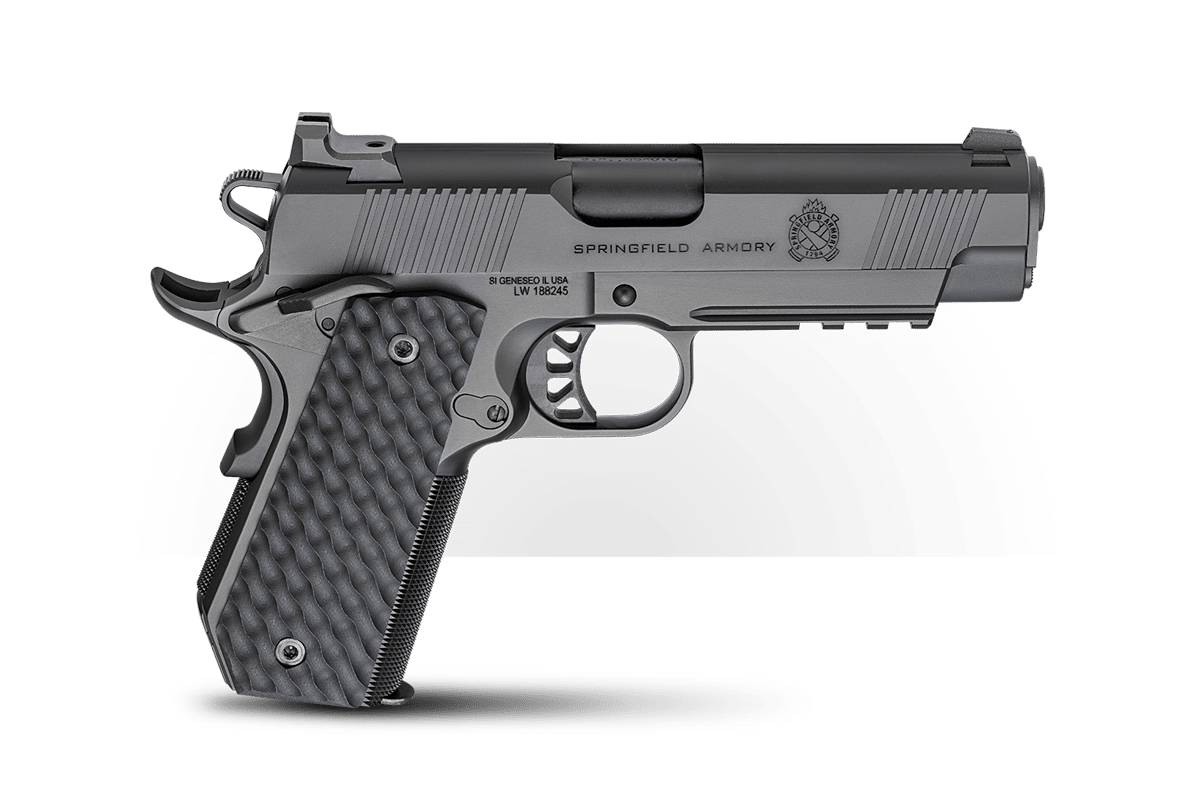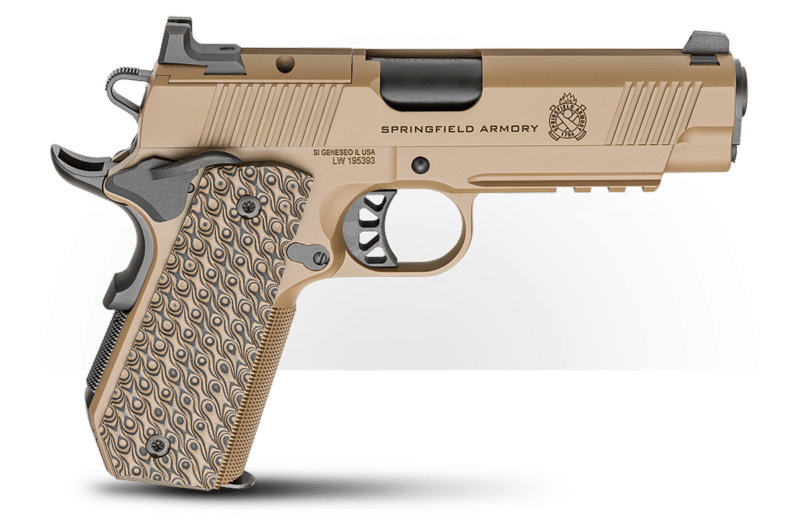Springfield Armory 1911 TRP Review — 4.25″ Carry Contour in .45 ACP
October 14th, 2024
7 minute read
In today’s article, Rob Garret reviews the Springfield Armory 1911 TRP 4.25″ Carry Contour handgun. Springfield Armory is well known for its excellent 1911 pistols, and the new TRP line is no different. Springfield loaned the semi-automatic pistol to the author for review.
Naming a product is a tricky and difficult endeavor. It becomes even more complicated when the name is abbreviated. When this process is done poorly, it can become the subject of memes and jokes. When done correctly, the firearm and the name become synonymous with each other, and “icons” are born. Such is the case with the Springfield Armory Tactical Response Pistol, or “TRP”.
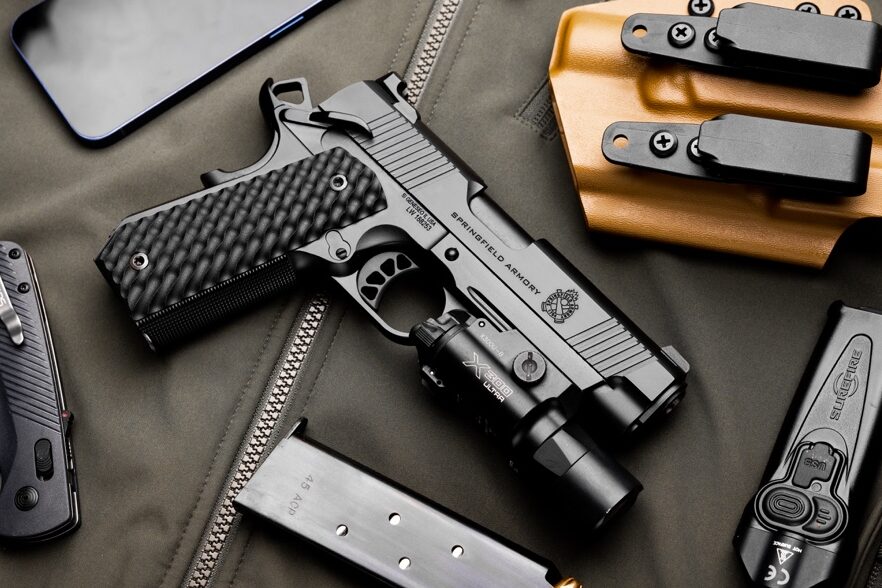
When introduced, the TRP was a semi-custom version of the Springfield Professional Model. The “Pro” was a Custom Shop build that became legendary with the FBI Hostage Rescue Team. The TRP offered a similarly featured 1911 to the shooting public, but without the cost and wait associated with the Custom Shop Pro. I’ve evaluated several TRP models in the past, and have always been impressed with the quality, accuracy, and reliability, especially for the price point.
Recently, Springfield Armory revamped the entire line of TRP pistols. The new line of .45 ACP pistols was introduced to the public at the 2024 SHOT Show and is very impressive. It is now available in a wide variety of configurations, from full-size 5” models to carry-ready 4.25” variants. Finishes include a black or coyote brown Cerakote.
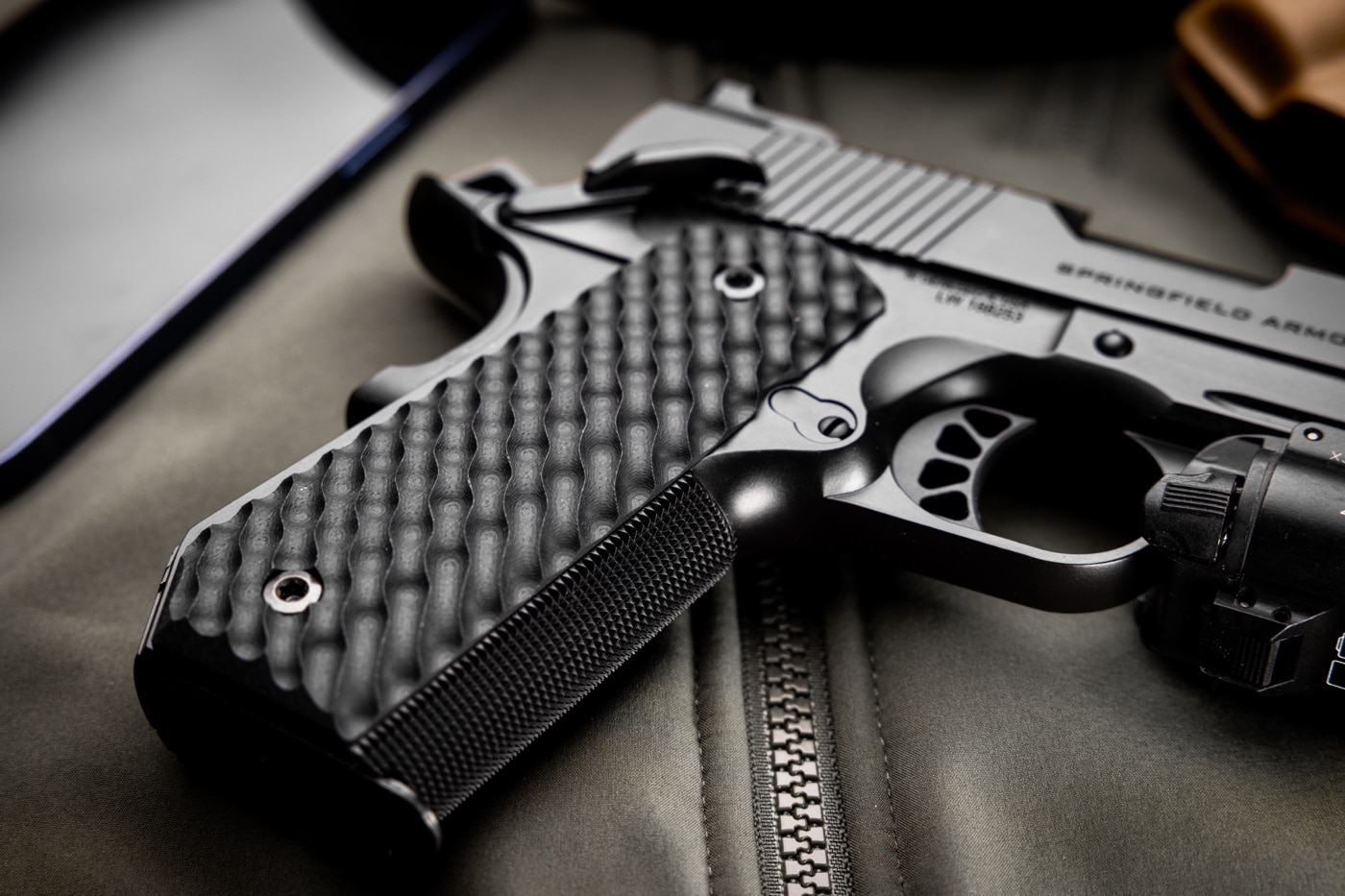
In my opinion, one of the most interesting offerings is what Springfield Armory calls a Carry Contour (CC) variant. Designed to enhance concealed carry, Springfield trims the rear corner of the frame near the magwell to reduce the likelihood of it “printing” under clothing.
The Springfield Armory Carry Contour
I received a TRP 4.25” Carry Contour for evaluation. In simple terms, our test pistol is a shortened 1911 with an alloy frame and an accessory rail. The pistol is faithful to the original 1911 design with a barrel bushing, a 4.25” barrel, and a non-captured recoil spring and shortened recoil spring guide rod.
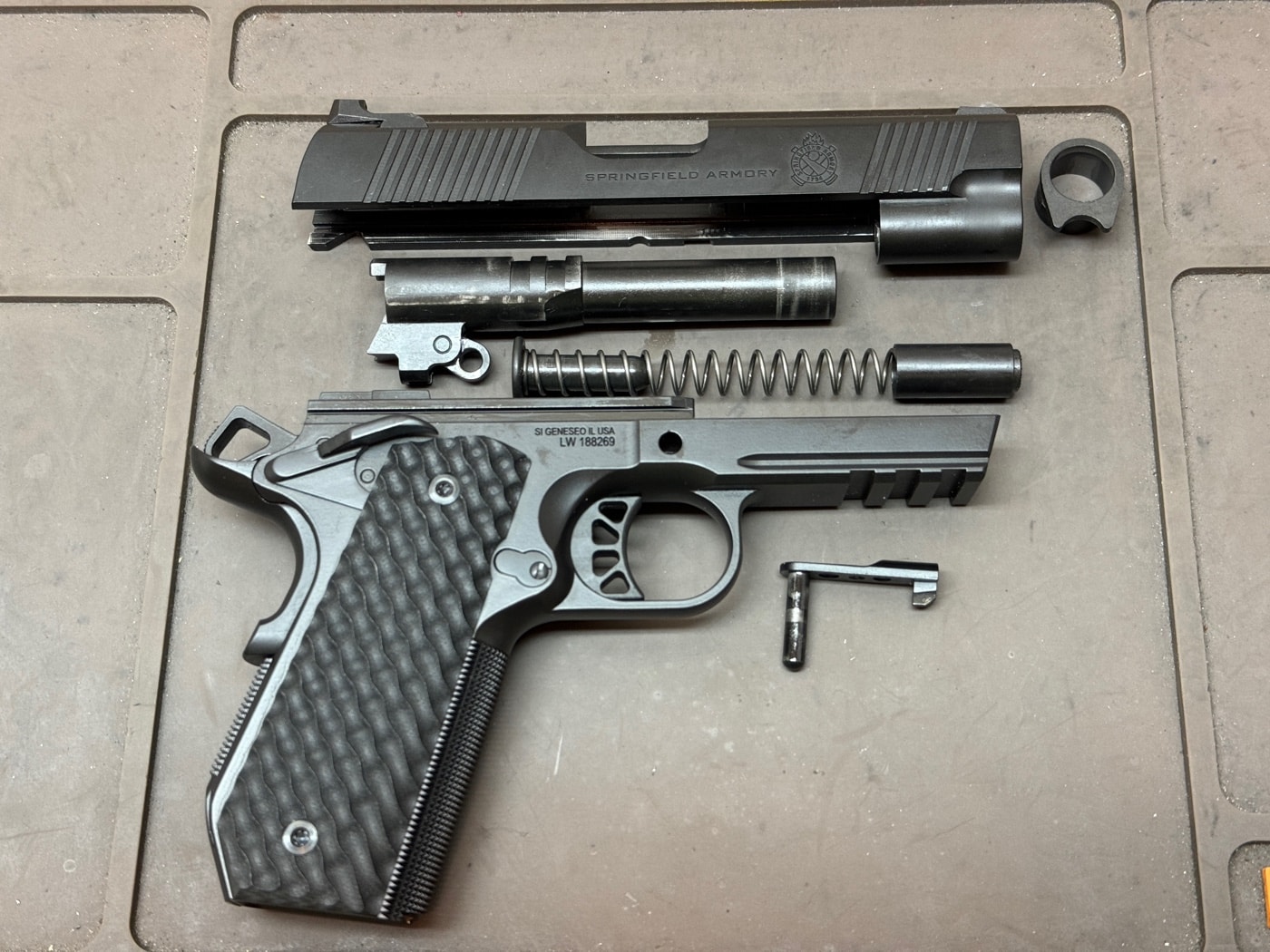
The feature set of the TRP is well thought out. The slide is made from forged carbon steel and has forward cocking serrations, a relieved ejection port and a serrated flat top. The edges have been nicely beveled and the rear of the extractor has been contoured to the slide.
Springfield opted for three-dot tritium sights on the TRP. The front sight is a dovetailed post with a Tritium insert. The rear sight is a “ledge” design and Springfield has beveled the edges to remove any offending surfaces. The rear sight has double Tritium inserts that provide a “three-dot” sight picture. I especially like the clean marking on the slide with the company’s name and crossed cannons logo on the right side and “TRP”, in small block font, on the left side.
Moving to the frame, it is forged from an aluminum alloy. The frontstrap features 20 LPI checkering that corresponds to the abbreviated checkering on the bobbed Carry Contour mainspring housing. The beavertail grip safety is fit very well and has a “speed bump” for positive engagement. The ambidextrous thumb safety is very positive and the left side paddle is slightly larger than the right. The slide stop is a standard 1911 configuration.
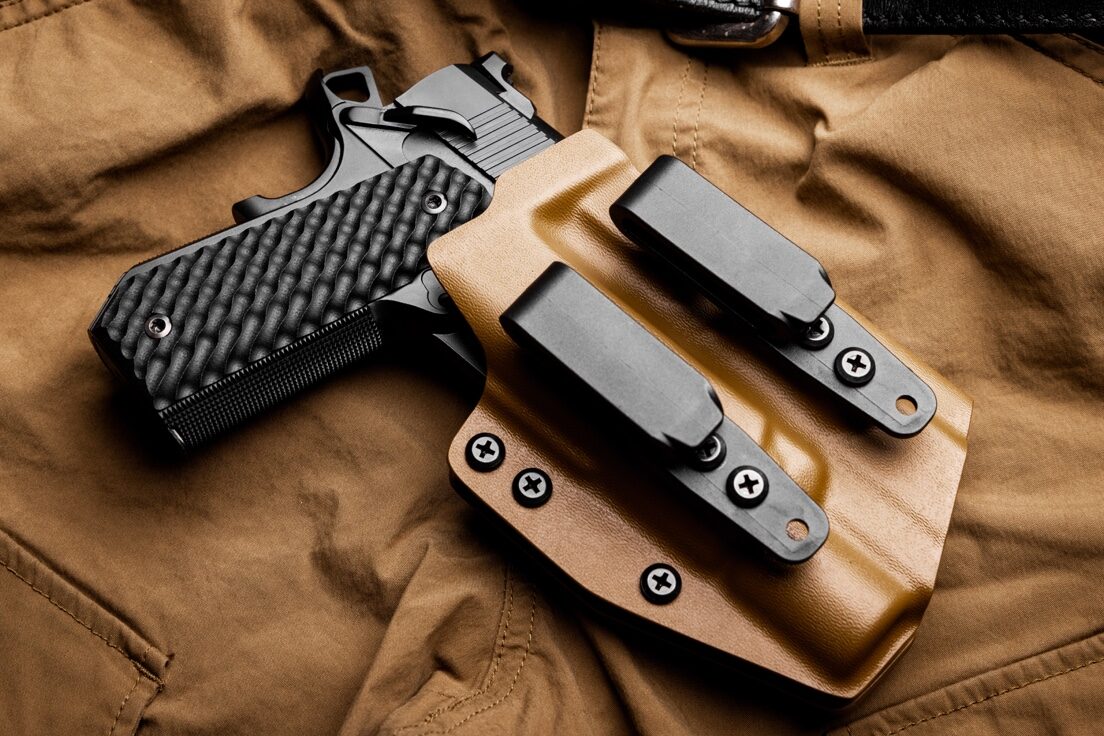
Shooters will notice that the skeletonized trigger is made of polymer. VZ Hydra G-10 stock panels provide a positive purchase on this M1911 pistol and are also very attractive. The magazine well is nicely beveled to assist in reloads. The TRP CC comes standard with three, blued steel, seven round magazines.
When I disassembled the TRP, I was pleased to see that the slide and barrel has engraved numbering that matches the serial number of the frame. I found no machining or tool marks on any interior surface. I also appreciated that the contact surface of the slide stop that interacts with the slide stop retaining pin was properly beveled. It’s the small details that remind me that Springfield Armory does understand the 1911!
The trigger on our test pistol broke at 4 lbs. 2 oz. with no creep and minimal overtravel. It was very clean, but I would describe it as a soft break as opposed to the glass rod type of break. This could be the result of the polymer trigger that does not transfer vibration in the same manner as an aluminum trigger. The reset was positive and, all in all, I was very impressed with the trigger.
As with all Springfield pistols, the new TRPs feature a hammer forged barrel that is match grade. I was surprised to find that the 4.25” TRP has a full ramped barrel most often found on 9mm 1911s.
Springfield TRP Carry Contour Specifications
| Caliber | .45 ACP |
| Color | Black or coyote brown |
| Barrel | 4.25” forged stainless/match grade/fully ramped |
| Slide | Forged carbon steel |
| Frame | Forged aluminum alloy |
| Sights | Tactical Rack 3-dot tritium |
| Weight | 27.3 oz. |
| Length | 7.9” |
| Magazine Capacity | 7 rounds of ammunition (3 mags included) |
| Grips | VZ Grips Hydra G-10 |
| MSRP | $1,999.99 |
Testing the 1911 TRP at the Shooting Range
As is my custom, when evaluating a new pistol, I gathered a large sampling of different .45 ACP ammunition. The ammo ranged from standard 230-gr. ball to the hot Super Vel’s hot 160-gr., solid copper hollow point +P load and Black Hills 135-gr. Honeybadger load. I ran my normal 1911 testing protocol with each load. This drill included feeding the top round, from slide lock, with a full magazine, testing the ejection pattern by firing 10 rounds without a magazine in the pistol, and feeding the last two rounds in the magazine to ensure slide lock on an empty magazine. The little TRP passed these tests with no malfunctions using both FMJ and hollow-point bullets.
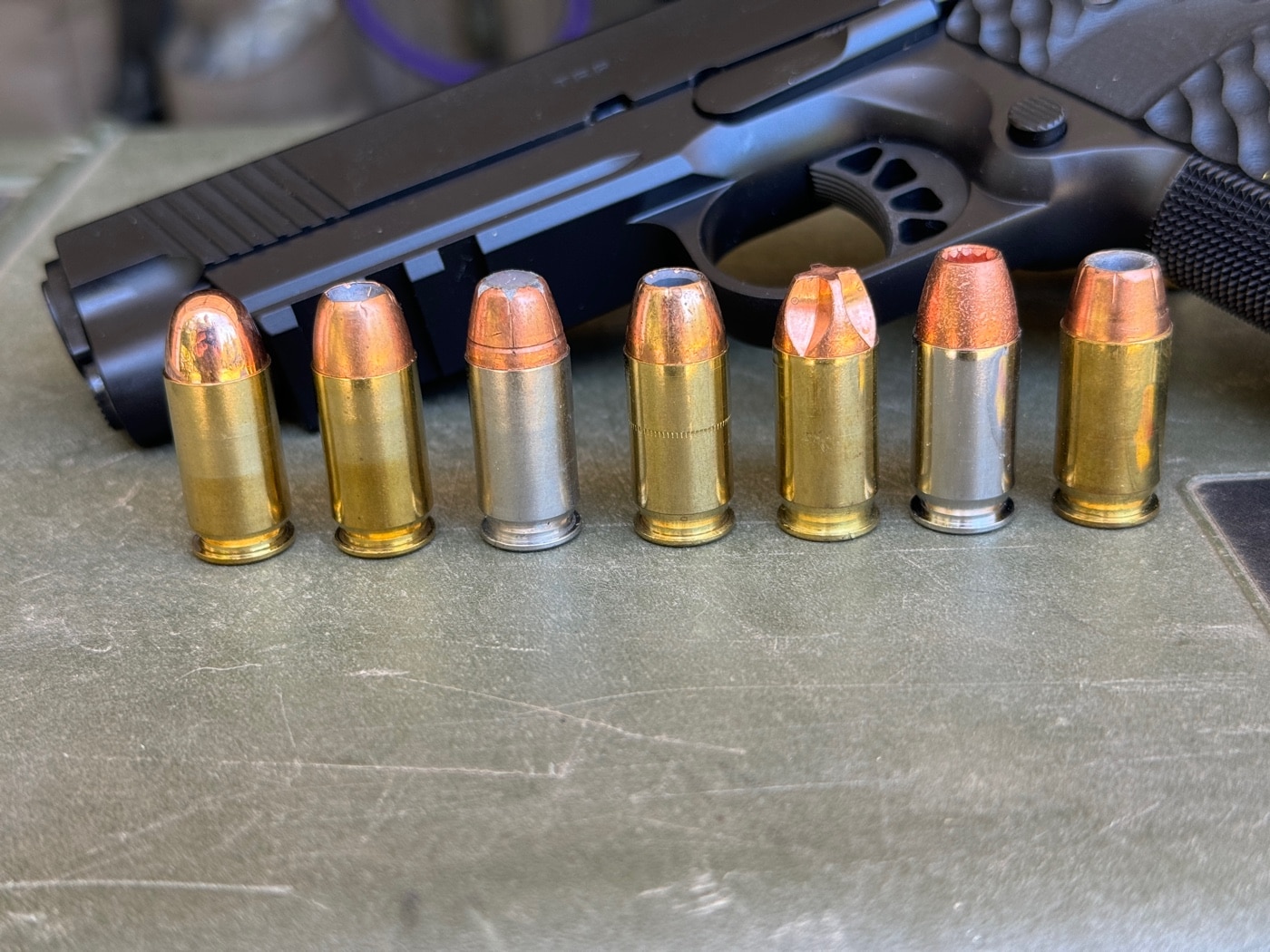
In shooting various drills, and targets, and from a variety distances, I found the TRP to be well mannered. The perceived recoil was also less than I expected from an alloy frame .45 ACP. The operating controls functioned properly and I had no issues with the thumb safety or the grip safety. I appreciated the “wave” pattern of the VZ Hydra stocks and “Super Scoop” that guides the thumb to the magazine release.
The magazines functioned without any issues and ejected cleanly from an open slide configuration. The magazine follower had the typical raised “button” that is designed to provide proper tension on the last round in the magazine. I found that the “button” made loading the first round more difficult than normal.
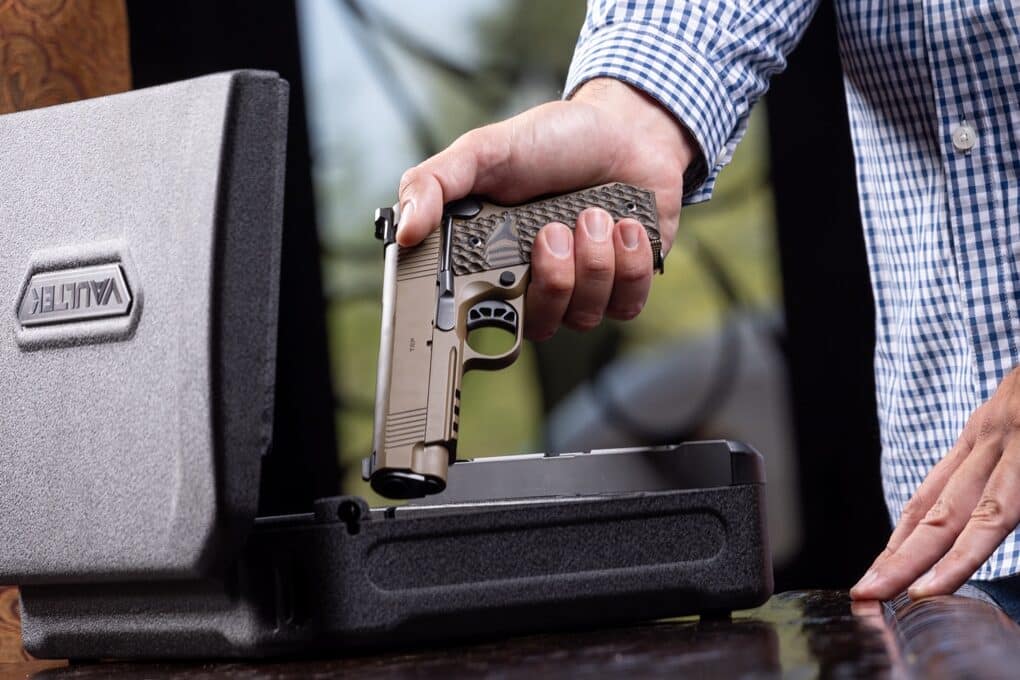
The two negatives that I found were purely subjective on my part. First, the machine checkering on the frame is pretty sharp. I can see after 500 rounds, or so, it could be uncomfortable. In addition, when carried concealed, these surfaces could abrade a shirt or jacket. I don’t object to the 20 LPI checkering, but, I would like to see the tips of the pattern softened.
The other issue I found was, with my aging eyes, I had difficulty with the sights. The only contrast between the black front and rear sight is the small silver ring and Tritium insert. The inserts and the same size tending to make the sight picture a little “too busy”. This may not be an issue with shooters with younger and better eyes. I would prefer an all-black rear sight with a contrasting front sight, similar to a XS Standard Tritium Dot.
Final Thoughts on the Springfield 1911 TRP
The reintroduction of the TRP has been welcomed by the Springfield community. Our test pistol was everything that we have come to expect from the TRP guns. Given the features and quality, the MSRP is very reasonable for 2024.
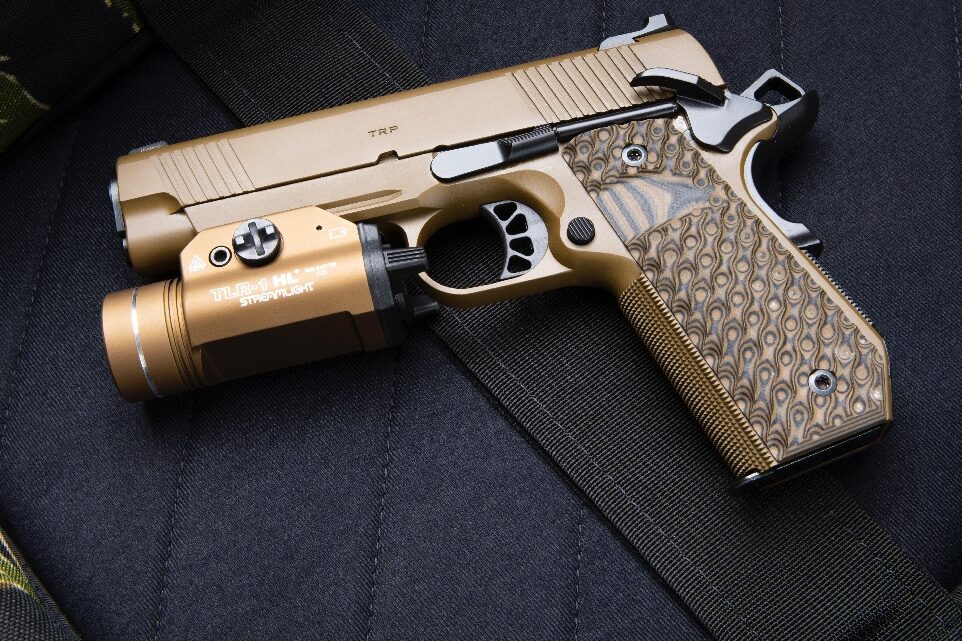
The Carry Contour is also available in black. For those who prefer a traditional Commander the TRP Classic 4.25-inch will fill the bill. Find one at your local dealer. You will not be disappointed.
Editor’s Note: Please be sure to check out The Armory Life Forum, where you can comment about our daily articles, as well as just talk guns and gear. Click the “Go To Forum Thread” link below to jump in and discuss this article and much more!
Join the Discussion
Featured in this article
Continue Reading
Did you enjoy this article?

 223
223




